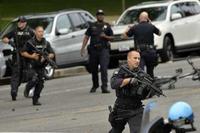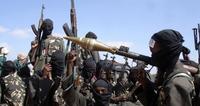-
Discovery points way to treatment of lethal toxin botulism

Botulinum neurotoxins are produced by Clostridium botulinum and cause the possibly fatal disease botulism, which impedes nerve cells’ ability to communicate with muscles and can lead to paralysis and respiratory failure. The botulinum toxin has also been identified as a potential biological weapon against a civilian population. Scientists have decoded a key molecular gateway for the toxin that causes botulism, pointing the way to treatments that can keep the food-borne poison out of the bloodstream.
-
-
More government troops than rebels killed so far in Syria
The most recent fatality report from the reliable, U.K.-based Syrian Observatory for Human Rights says that between the start of the war in March 2011 and 31 August 2013, 110,371 people had died in Syria. The breakdown of those killed: 40,146 civilians (including 4,000 women and more than 5,800 children); more than 45,000 government troops (made up of 27,654 army soldiers, 17,824 pro-regime militia, and 171 members of Hezbollah); 21,850 rebel fighters; and 2,726 unidentified people.
-
-
German neo-Nazis targeted Chancellor Gerhard Schröder for assassination

Beate Zschäpe, the last surviving members of the National Socialist Underground, a violent German neo-Nazi group, is on trial this month for taking part in the murders of eight Turkish immigrants, one Greek man, and a German policewoman, in addition to participating in fifteen bank robberies and two bomb attacks. In testimony Monday, a police investigator said that computer files found in an apartment used by NSU member indicate that in 2002, the group was working on a plot to assassinate the then-chancellor Gerhard Schröder.
-
-
Libya sliding toward anarchy: PM abducted, then released
In the most ominous sign yet that Libya is sliding toward anarchy two years after the rebellion that ended Col. Muammar al-Qaddafi’s four decades of dictatorship, members of a Libyan militia which is supportive of the government earlier today abducted the Libyan prime minister, Ali Zeidan, then released him after several hours. The anger in Libya over the U.S. Saturday operation to seize al Qaeda leader Abu Anas al-Libi, has intensified an already simmering anger toward the corrupt and ineffectual Zeidan government. On Monday, soldiers who were complaining that they had not been paid occupied Zeidan’s Tripoli office. Libyan oil production has been at a standstill since July, with striking troops in the east and tribal militias blockading ports and oilfields claiming oil revenues are being stolen by militias close to Zeidan or misspent. Libya does not have credible army, police, or security forces, and the government relies on freewheeling militias, formed during and after the anti-Qaddafi rebellion, to provide security.
-
-
Greater role for Pentagon in next phase of U.S. war on terror

The Obama administration had dramatically increased the use of drones in the war against terrorists. The number of drone strike has declined this year relative to the high levels of 2010-11. The number of drone strikes may increase again, but this past weekend’s Special Forces raids in Somalia and Libya are an indication that the next phase in the U.S. war on terrorism would see, in relative terms, less of a reliance on CIA-operated drones and a greater role for the Pentagon.
-
-
A guide to terrorist, security actors in East Africa
The continuing violence in East Africa is often attributed to Somalia’s instability, triggered by the collapse of the government more than twenty years ago, and the descent of the country into a war among war lords, tribes, and religious factions. Here is a useful guide to the main groups and organizations which operate in the region which extends from Eritrea in the north to Tanzania in the south.
-
-
Three leading African terrorist groups: similarities and differences
Three African Islamist terrorist organizations — al-shabaab, al-Qaeda in the Maghreb, and Boko Haram – have been responsible for many acts of terrorism. The three groups, or at least their leaders and most of their followers, adhere to a Wahhabi version of Islam, which is practiced in Saudi Arabia, and all oppose Western influence in the countries in which they operate. The groups also share a penchant for internal factional violence, and senior leaders of both al Shabab and Boko Haram were recently killed by rivals. There are, however, important differences among the three groups.
-
-
Libya condemns U.S. capture of al-Ruqai
The Libyan government on Sunday harshly criticized what it described as the “kidnapping” of one of its citizens after U.S. Specia Forces captured al Qaeda senior leader Nazih Abdul-Hamed al-Ruqai. The Libyan military indicated it was not privy to the U.S. operation. Libya does not have a functioning central government, except in name, and U.S. efforts to shore up the weak and demoralized Libyan security services and train them in counterterrorism have yet to bear fruit. Other problems with Libyan security services are corruption, and the fact that many in the security services are more loyal to their clan or tribe than to the government they serve. This is why even Libya’s military leaders, who have received counterterrorism training and funding from the United States, have not been informed of the operation in advance.
-
-
U.S. Special Forces kill al Shabab leader in Somalia, capture al Qaeda fugitive in Libya
A Navy SEAL team attacked – and, in all likelihood, killed — a senior al-Shabab leader in an early Saturday raid on his seaside villa in the Somali town of Baraawe, 150 miles south of the capital Mogadishu. American officials said the raid was in response to the militant group’s attack on the Westgate shopping mall in Nairobi three weeks ago. This was the most significant raid by American troops on Somali soil since commandos killed Saleh Ali Saleh Nabhan, a Qaeda mastermind, near the same town in 2009. In a separate raid, U.S. commandos captured Nazih Abd al Hamid al-Ruqhay, known by his nom de guerre, Abu Anas el-Liby, a senior leader of al Qaeda indicted in the 1998 bombings of the United States embassies in Kenya and. The capture ends a 15-year manhunt. El-Liby, since 2000, has been high on the list of the U.S. government’s most-wanted list, and the FBI had placed a $5 million reward on his head.
-
-
Shots exchanged near Capitol Hill, suspect – a woman -- hit

Shots were exchanged around 2:15 p.m. this afternoon outside the Hart Senate Building on Capitol Hill between police officers and a lone gunmen. Congressional buildings on both the Senate and the House side were placed under lock-down for about an hour. The lock-down was lifted at 3:00p.m. Police said the fire was exchanged between police officers and a woman in a black car, who had earlier was driving suspiciously near the White House. She sped away from the White House when police approached her, and sped toward Capitol Hill.
-
-
Terrorism hobbles business investment in north, east Africa

Images of the terrorist attack in Nairobi’s Westgate Mall have reinforced the belief that business investment in those parts of Africa where terrorist groups are active is risky despite improvements in living standards.
-
-
Societies with rigid cultural values produce more terrorists

Examining more than 80,000 terrorist attacks which occurred between 1970 and 2007, researchers find that cultural values and norms which promote rigid thinking are related to a greater number of terrorist attacks or fatalities. Societies that have the belief that one’s destiny and life events are predetermined (fatalism), have very strong norms and severe punishments for deviation from norms (cultural tightness), and those that privilege masculinity and have very distinct gender roles (low gender egalitarianism) have higher terrorism rates than those that are low on these dimensions.
-
-
Violent hate crimes, lone-wolf terrorism share characteristics
Researchers examined the timing, locations, methods, targets, and geographic distributions of lone-actor terrorist attacks, group-based terrorist attacks, and violent hate crimes that occurred in the United States between 1992 and 2010. They found that locations where the 101 lone-actor terrorism incidents occurred shared more demographic similarities with the locations of the 46,000 violent hate crimes than with the locations of 424 group-based terrorist attacks over the time period.
-
-
Boko Haran Islamists kill 78 college students

Boko Haram, the name of the Nigerian Jihadist Islamist insurgency group, means “Western Education is Sinful.” True to its name, the group has routinely attacked high schools and colleges in Nigeria, killing a large number of students and teachers. The latest attack came Saturday night, when Boko Haram militants attacked an agricultural college in northeastern Nigeria, killing seventy-eight students.
-
-
Two generals fired for costly Afghanistan failure
Gen. James F. Amos, the commandant of the Marine Corps, yesterday fired two generals for failing properly to protect a U.S. base in southern Afghanistan, allowing Taliban fighters to storm it last year, killing two Marines and destroying a half a dozen U.S. fighter jets. Military historians note that the last two-star general to be fired for combat incompetence was Army Maj. Gen. James Baldwin, who was relieved of command in 1971 under similar circumstances: the North Vietnamese attacked a poorly protected U.S. outpost, killing thirty soldiers.
-
More headlines
The long view
What Does Netflix’s Drama “Adolescence” Tell Us About Incels and the Manosphere?
While Netflix’s psychological crime drama ‘Adolescence’ is a work of fiction, its themes offer insight into the very real and troubling rise of the incel and manosphere culture online.
